Course Summary
This flexible masters degree is suitable for anyone interested in the roles that language plays in society across a range of personal and professional contexts.
College Link
Career Sectors
This course prepares you for working in the Career Sectors below. Follow the links to get a fuller understanding of the sectors you are preparing for.
Entry Requirements
To study for this masters degree course you must hold a bachelors degree from a UK university or another recognised degree-awarding body, or a qualification at an equivalent level.
As our modules are taught in English, your spoken and written English must be of an adequate standard for postgraduate study in the UK. If English is not your first language, we recommend that you will need a minimum score of 7 under the International English Language Testing System (IELTS). Please see their website for details.
If you are not sure whether your qualifications and experience are suitable, please contact us for advice.
Application Details
See Course Web Page link for next start date.
Fees
The Student
Career Interests
This course is typically suited for people with the following Career Interests. If these interests do not describe you, this course may prepare you for work you may not find satisfying.
Linguistic
The Linguistic's interests are usually focused on ideas and information exchange. They tend to like reading a lot, and enjoy discussion about what has been said. Some will want to write about their own ideas and may follow a path towards journalism, story writing or editing. Others will develop skills in other languages, perhaps finding work as a translator or interpreter. Most Linguistic types will enjoy the opportunity to teach or instruct people in a topic they are interested in.
Investigative
The Investigative person will usually find a particular area of science to be of interest. They are inclined toward intellectual and analytical activities and enjoy observation and theory. They may prefer thought to action, and enjoy the challenge of solving problems with sophiscticated technology. These types prefer mentally stimulating environments and often pay close attention to developments in their chosen field.
Career Progression
This qualification is designed to enrich your knowledge and improve your professional practice. On completing your studies, you should be able to:
demonstrate self-direction and originality in tackling and solving problems at a professional or equivalent level
reflect critically and constructively, in the light of ideas and frameworks presented in the modules, on how these apply to your practice and organisational context.
You will also acquire qualities and transferable skills that are highly prized by employers within education and related fields, such as:
exercising initiative and personal responsibility
the ability to make decisions in complex and unpredictable situations
the ability to draw on appropriate research and ethical understanding
the capacity to produce reports/outputs for academic and professional purposes.
You will be guided through the materials and learn how you can recognise and acknowledge these additional skills.
Please note that this master’s degree does not qualify you for teacher registration in any country.
Duration
How long it takes
Most students study the MA in Linguistics part-time, completing 60 credits a year over three years. Typically, this means 13–19 study hours each week.
You must complete the MA in Linguistics within six years.
*You can complete your studies part-time in three years. However, your last module, Linguistics dissertation (L807), is expected to begin in October 2026 and be 46 weeks in study length, so you’ll receive your final results in late October 2027 rather than in June/July.


